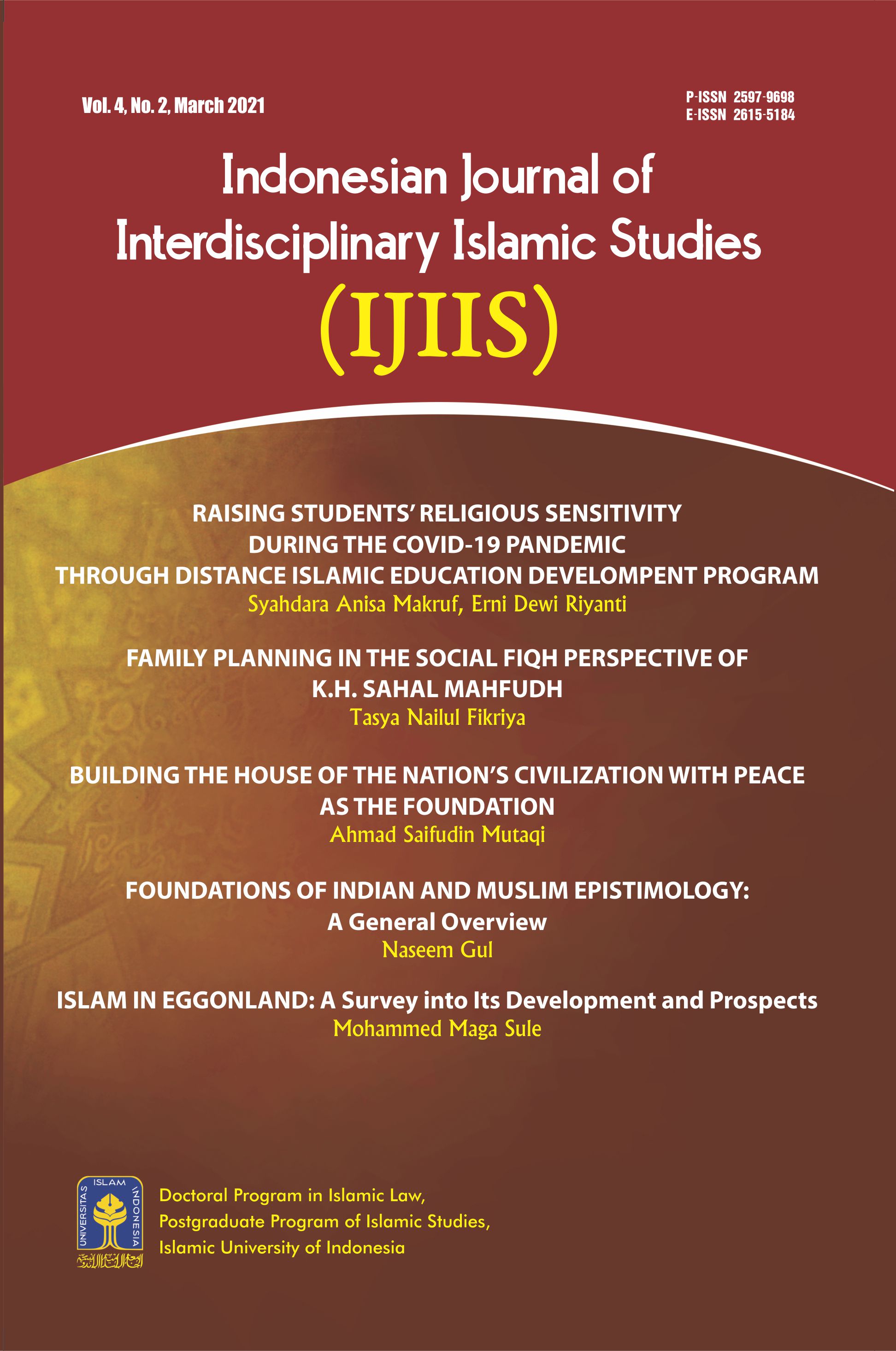Main Article Content
Abstract
Little has so far been discussed or written about Islam and Muslims in Eggonland. This is in marked contrast to other ethnic groups in the state which share similar characteristics being a Muslim community that attracted attention from scholars of either Muslim or non-Muslim. The aim is paper is to ascertain the Islam in Eggonland Yesterday, Today and Tomorrow. It has been found that unlike the Erro Eggon clan which have almost 97% of its population being Muslims, Muslim population are not many as that of the Eggon Erro especially among the Anzo, Eholo clan, and it is only in communities that belong to Eggon Erro that large proportion of Muslims communities are found. This paper attempts to provide the much-lacking information on the spread and development of Islam in Eggonland. The paper discussed the coming of Islam, the means through which Islamization process took place and the establishment of Muslim communities in Eggonland, it also shows to the world true picture of Islam among the Eggon people. Detail attention has been given to the factors which contributed to the spread of Islamic teachings in Eggonland including the role of Muslim scholars, both within and outside Eggonland, Muslim organisations, etc. Equally important in this paper is the contributions of Muslim organizations in the development of Islamic education in Eggonland where schools that combine both Islamic and Western education were established. The paper sum up that, the prospects of Islam lies in the devotion of young generation to the learning of Islamic knowledge in Eggonland with the establishment of formal Islamic schools that produces Da’is who can speak the Eggon language fluently. The paper adopted qualitative methodology and desk review where In-depth Interview were conducted with few personalities to obtain data for the research.
Keywords
Article Details

This work is licensed under a Creative Commons Attribution-ShareAlike 4.0 International License.
References
- Blench, R (2015). A Dictionary of Eggon Language, Cambridge, UK: Kay Williamson Foundation, 2015,
- JIBWIS, (2013). A Document of the Jama’atu Izalatil Bid’ah Wa’iqamatis Sunnah (JIBWIS), Nigeria.
- Eggon in Nigeria. https://joshuaproject.net/people group/11721/. Retrieved 17/05/2020.
- Its chrisdfirst, (2016). Eggon: People, Lifestyle and Culture. https://itschrisdfirst.blogspot.co.ke/2016/04/eggonpeople-lifestyle-and-culture.html?m=1. Retrieved 12/04/2020.
- Enna, D. M. (2015). Resurgence of Ethnic Minority Identity through Performance: A Case of the Eggon. International Journal of African Society, Cultures, and Tradition.
- Envuladu, A. (2014). Eggon Nation from 11th Century to Date, Jos, Nigeria, Np.
- Focus on Nassarawa Eggon Local Government, (1993). A Pamphlet of the Local Government Information Unit.
- Muhammad, M.K and Al- Hilali, M.T. The Interpretation of the Meanings of The Noble Qur’an in the English Language. Darussalam.
- Mahmud I.B., (1994). Islam in North-Central Nigeria: The Islamization Programme of Sir Ahmadu Bello. Kaduna: Amanawa Press.
- Nasara M., (2011). Eggon and the Power of the Ancestors. Lafia: Sakpa Press,
References
Blench, R (2015). A Dictionary of Eggon Language, Cambridge, UK: Kay Williamson Foundation, 2015,
JIBWIS, (2013). A Document of the Jama’atu Izalatil Bid’ah Wa’iqamatis Sunnah (JIBWIS), Nigeria.
Eggon in Nigeria. https://joshuaproject.net/people group/11721/. Retrieved 17/05/2020.
Its chrisdfirst, (2016). Eggon: People, Lifestyle and Culture. https://itschrisdfirst.blogspot.co.ke/2016/04/eggonpeople-lifestyle-and-culture.html?m=1. Retrieved 12/04/2020.
Enna, D. M. (2015). Resurgence of Ethnic Minority Identity through Performance: A Case of the Eggon. International Journal of African Society, Cultures, and Tradition.
Envuladu, A. (2014). Eggon Nation from 11th Century to Date, Jos, Nigeria, Np.
Focus on Nassarawa Eggon Local Government, (1993). A Pamphlet of the Local Government Information Unit.
Muhammad, M.K and Al- Hilali, M.T. The Interpretation of the Meanings of The Noble Qur’an in the English Language. Darussalam.
Mahmud I.B., (1994). Islam in North-Central Nigeria: The Islamization Programme of Sir Ahmadu Bello. Kaduna: Amanawa Press.
Nasara M., (2011). Eggon and the Power of the Ancestors. Lafia: Sakpa Press,
